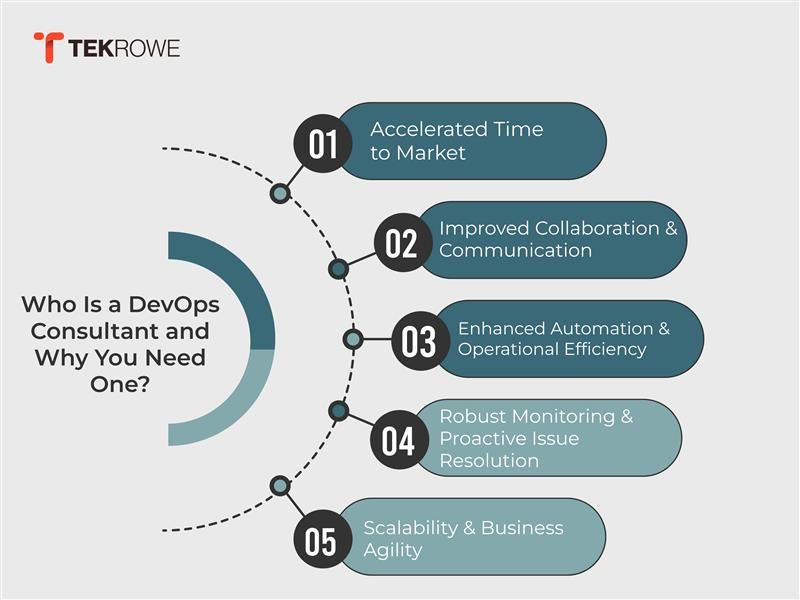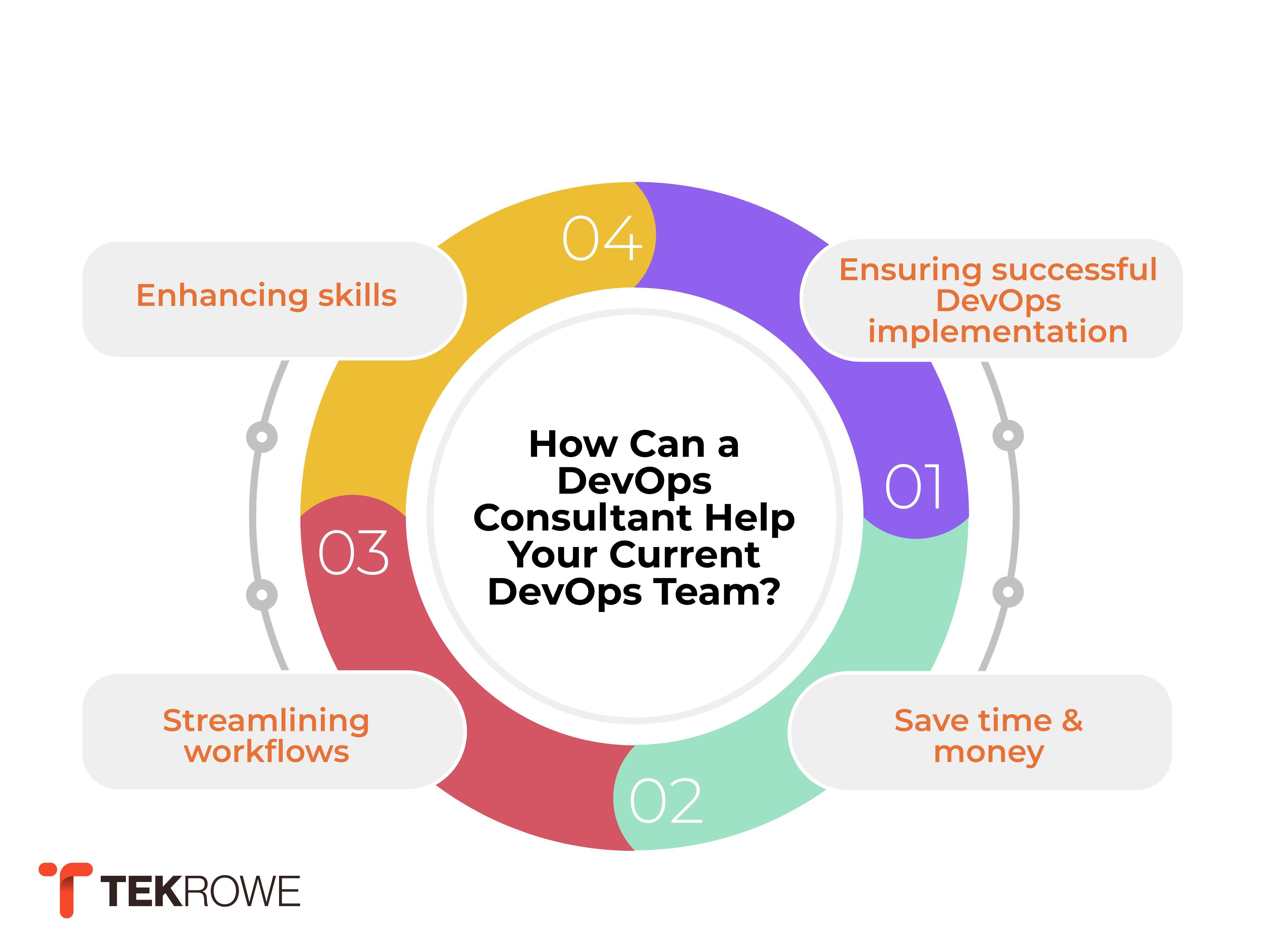In today’s hyper-competitive digital landscape, businesses are racing to deliver faster, more reliable, and scalable software solutions. As organizations strive to meet customer demands and bring products to market more quickly, the pressure on development and operations teams has never been greater. To navigate this fast-paced environment, companies are increasingly turning to DevOps consultants—professionals who specialize in helping organizations integrate and optimize DevOps practices.
These experts bridge the gap between development and operations, improving efficiency, reducing downtime, and enabling seamless software delivery. According to a 2022 Global DevOps Market report by Allied Market Research, the global DevOps market is projected to reach $37.22 billion by 2030, growing at a compound annual growth rate (CAGR) of 24.2%. This underscores the growing importance of DevOps in modern businesses and why having a DevOps consultant guide your transformation is critical to staying competitive. In this blog, we will dive deep into how partnering with a DevOps consultant can revolutionize your development processes, how DevOps consulting services can drive better results, and how a well-executed DevOps strategy consulting approach can position your business for long-term success.
What is DevOps?
DevOps is a comprehensive approach that combines tools, practices, and a cultural mindset to bridge the gap between Development and Operations teams. It aims to streamline processes by automating workflows, fostering collaboration, and enhancing communication across teams. DevOps emphasizes team empowerment, breaking down silos, and encouraging shared responsibility to create a more cohesive and efficient development environment. Beyond technology, DevOps focuses on cultural transformation, building trust and collaboration between system administrators and developers. It also implements key methodologies such as:
- Continuous Integration (CI)
- Continuous Delivery (CD)
- Continuous Deployment (CD)
Adopting DevOps practices ensures that your business is equipped to create and maintain more reliable, scalable, and efficient product environments, accelerating delivery and improving overall performance.
How Does DevOps Work?
DevOps is a collaborative approach where development and operations teams work together throughout the entire software development lifecycle. Its primary goal is to improve the speed and quality of software deployment. DevOps represents a significant cultural shift, moving away from siloed teams toward integrated, cross-functional collaboration. Under this model, development and operations teams often merge into a single, cohesive unit, where developers are involved in every stage of the application lifecycle, leveraging a wide range of skills.
A key aspect of DevOps is the use of automation tools to streamline and accelerate development processes. Automation increases both the reliability and efficiency of software development, allowing teams to focus on innovation and improvement. A DevOps toolchain supports key practices like Continuous Integration, Continuous Delivery, and Continuous Deployment, all while fostering collaboration and automating essential tasks.
What Does a DevOps Consultant Do?
A DevOps consultant is an external expert brought in to help organizations implement and optimize DevOps practices. Unlike an in-house DevOps engineer, a consultant offers a fresh perspective, helping businesses embrace DevOps to enhance efficiency, reduce costs, and streamline workflows. The consultant’s role involves analyzing current processes, identifying gaps, and recommending improvements, often through introducing automation, tool optimization, and workflow management.
DevOps consultants provide value by:
- Optimizing tool usage: Ensuring that development teams use the right tools effectively.
- Enhancing software testing efficiency: Streamlining testing processes for faster, more reliable outcomes.
- Managing workflow automation: Introducing automation across the Software Development Lifecycle (SDLC) to increase productivity.
- Modernizing the SDLC: Implementing advanced tools and methodologies to keep teams agile.
- Accelerating time-to-market: Improving delivery times by refining processes and tools, enabling faster software releases.
Ultimately, a DevOps consultant helps businesses modernize their development environments and achieve faster, more efficient software delivery.
Who Is a DevOps Consultant and Why You Need One?
A DevOps consultant is a seasoned expert who helps organizations implement, refine, and manage DevOps methodologies. They bring a wealth of knowledge in automation, continuous integration, and continuous delivery (CI/CD) pipelines, ensuring that your teams work more cohesively and efficiently. The role of a DevOps consultant extends beyond technical implementation. They assess your company’s existing infrastructure, identify pain points, and develop a roadmap for smoother collaboration between development and operations teams. Their goal is to create an environment where software is built, tested, and deployed faster and more reliably, ultimately improving your organization’s agility. Working with DevOps consulting services can be a game-changer for organizations looking to enhance their operational efficiency, accelerate software delivery, and ensure system reliability.
By leveraging the expertise of a DevOps consultant, businesses can streamline their development and operations processes, aligning teams, automating workflows, and fostering a culture of continuous improvement. Below, we explore in greater detail because partnering with DevOps consulting services can propel your business to new heights.

1. Accelerated Time to Market
In today’s fast-paced digital economy, time is money, and the speed at which you can bring a product or update to market is often a key differentiator. A DevOps consultant plays a crucial role in cutting down the time required for software development and deployment. A report by Puppet's 2021 State of DevOps revealed that organizations using DevOps practices can deploy software 30 times faster and recover from failures 168 times faster than those relying on traditional development processes. This is made possible by automating repetitive and time-consuming tasks such as:
- Testing: Automated testing ensures that code changes are validated more quickly, allowing teams to catch and fix bugs earlier in the development cycle.
- Deployment: Continuous integration and delivery (CI/CD) pipelines automate the deployment of software updates, reducing the need for manual intervention and minimizing the risk of human error.
- Monitoring: Automated monitoring tools keep an eye on system performance in real-time, enabling faster identification and resolution of issues.
By optimizing these tasks, DevOps consulting services enable your teams to deliver high-quality software faster, ensuring that your business can quickly respond to customer needs, market shifts, and competitive pressures.
2. Improved Collaboration and Communication
Traditionally, development (Dev) and operations (Ops) teams have worked in silos, often resulting in miscommunication, inefficiencies, and a lack of alignment on shared goals. This fragmented approach can cause delays, increase the likelihood of errors, and impede progress. A DevOps consultant brings these teams together, fostering a culture of collaboration where they work toward common business objectives. Here’s how DevOps expert consulting breaks down silos and improves collaboration:
- Shared Responsibilities: DevOps encourages shared ownership of both code development and operational stability. Developers are more aware of how their code impacts production, while operations teams are more involved in the development cycle.
- Integrated Tools: A DevOps consultant introduces tools that facilitate real-time communication and collaboration. Platforms like Slack, Jira, and other project management tools become central hubs where teams can collaborate on tasks and track progress.
- Faster Problem Resolution: When Dev and Ops teams work closely, they can solve problems faster. This reduces downtime and ensures that production environments run smoothly.
By adopting DevOps consulting services, your organization fosters a unified approach to development and operations, improving both speed and efficiency in delivering business outcomes.
3. Enhanced Automation and Operational Efficiency
One of the core principles of DevOps is automation, and a DevOps consultant plays an instrumental role in automating your entire software delivery pipeline. By automating key processes, businesses can free up valuable resources, reduce human error, and ensure consistent results. According to Gartner, companies that automate 70% of their DevOps processes can reduce production issues by 50%. Automation can be applied across multiple areas:
- Testing Automation: Automated testing frameworks ensure that code changes are continuously tested for functionality, performance, and security. This reduces manual testing efforts and allows teams to find issues earlier in the pipeline.
- Infrastructure Automation: With Infrastructure as Code (IaC), a DevOps consultant can automate infrastructure provisioning, ensuring that environments are consistently configured across development, testing, and production environments.
- Continuous Integration/Continuous Delivery (CI/CD): Automating the CI/CD pipeline ensures that code is integrated, tested, and deployed in a continuous loop. This allows teams to push updates and new features more frequently without compromising quality.
By automating these processes, a DevOps expert consulting team helps your business achieve higher levels of operational efficiency, enabling your teams to focus on innovation and strategic initiatives rather than repetitive manual tasks.
4. Robust Monitoring and Proactive Issue Resolution
Monitoring is essential to maintaining the stability and reliability of your systems. Proactive issue detection can mean the difference between minor disruptions and major downtime. A DevOps consultant ensures that your organization has a robust monitoring system in place that tracks the performance of your infrastructure, applications, and networks in real-time. With DevOps consulting services, you gain access to a variety of monitoring tools that provide actionable insights:
- Real-Time Metrics: A comprehensive monitoring solution will capture performance metrics, including CPU usage, memory consumption, and network latency, allowing you to detect potential bottlenecks before they impact users.
- Proactive Alerts: Automated alerting systems notify teams immediately when performance issues arise, enabling swift action. This reduces downtime and minimizes the risk of prolonged outages.
- Incident Management: A DevOps consultant establishes effective incident management protocols, ensuring that issues are escalated to the right teams and resolved efficiently.
By minimizing downtime, improving system performance, and resolving issues proactively, DevOps consulting services enhance service reliability. This results in better customer experiences, increased trust, and improved business continuity.
5. Scalability and Business Agility
As your business grows, so must your infrastructure and operational capacity. Scaling your systems to meet increased traffic, more complex user requirements, and expanded services can be challenging. This is where the expertise of a DevOps consultant becomes invaluable. Here’s how DevOps consulting services help with scalability:
- Scalable Infrastructure: A DevOps expert consulting team will evaluate your existing infrastructure and recommend the necessary changes to ensure it scales smoothly. They’ll help you implement technologies like cloud computing, containerization (such as Kubernetes), and microservices architectures, which are designed to support scalable applications.
- Elastic Systems: With the help of cloud platforms like AWS, Azure, or Google Cloud, a DevOps consultant can set up elastic systems that automatically adjust resources (like storage, processing power, and bandwidth) based on traffic demand. This ensures that your applications remain performant even during peak usage.
- Automated Scaling: With Infrastructure as Code (IaC), scaling your infrastructure becomes automated. This allows your organization to scale up or down seamlessly without the need for manual intervention.
By ensuring your systems are designed for scalability and business agility, a DevOps consultant helps your business prepare for growth without sacrificing performance, reliability, or customer experience.
Key Elements of a DevOps Strategy Consulting Approach
A successful DevOps implementation requires more than just adopting new tools—it involves a comprehensive overhaul of your organization’s processes, culture, and infrastructure to ensure alignment with business goals. DevOps strategy consulting is vital for organizations aiming to fully leverage DevOps methodologies.
A well-structured DevOps strategy builds a foundation that ensures smooth integration between development and operations, promoting faster software delivery, improved quality, and scalability. Below are the key elements of a DevOps strategy that a DevOps consultant will help you develop and implement:
1. Comprehensive Assessment and Planning
The first and arguably most critical step a DevOps consultant takes is conducting a thorough assessment of your current workflows, development processes, and IT infrastructure. This phase is essential to understand where inefficiencies and bottlenecks lie within your existing setup.
What the Assessment Involves:
- Workflows: Evaluating the interaction between your development, operations, and testing teams. This includes understanding handoffs, communication, and collaboration inefficiencies that may slow down the development pipeline.
- Infrastructure: Analyzing your infrastructure’s capability to support modern DevOps practices, such as automation, continuous integration, and scalable environments.
- Tools and Frameworks: Reviewing the current set of tools your teams use for code management, testing, deployment, and monitoring. Identifying gaps in tools and frameworks is crucial for optimizing future workflows.
Once the assessment is complete, the DevOps consultant will create a customized roadmap tailored to your organization’s specific needs. This roadmap includes recommendations on the tools, technologies, and processes that should be adopted, and the implementation timelines. By aligning your DevOps strategy with your business goals, the consultant ensures that every step of the process contributes directly to improved operational efficiency and accelerated time-to-market.
Outcome:
This phase establishes a clear plan that is aligned with your company’s objectives. The roadmap acts as a guide, outlining the necessary steps to fully implement DevOps practices while reducing risks and ensuring smoother execution.
2. Automation of Toolchains and Processes
Automation is at the heart of DevOps, and it’s critical to streamlining your development lifecycle. A DevOps consultant focuses on automating as many repetitive tasks as possible, allowing your teams to focus on more strategic work rather than manual, error-prone processes.
Key Areas of Automation:
- CI/CD Pipelines: Continuous Integration (CI) and Continuous Delivery (CD) pipelines automate the integration of new code, testing, and deployment. This drastically reduces manual errors, speeds up release cycles, and ensures that every code update is automatically integrated, tested, and deployed with minimal downtime.
- Infrastructure Management: A key part of DevOps consulting services is implementing Infrastructure as Code (IaC), which automates the management of your infrastructure using code. This eliminates the need for manual infrastructure configuration, ensuring consistent environments across development, testing, and production stages.
- Testing: Automating testing processes ensures that code quality is maintained throughout the development lifecycle. By integrating automated testing into the CI/CD pipeline, you can catch bugs and vulnerabilities earlier in the process, reducing the risk of costly failures in production.
A DevOps consultant will evaluate the areas where automation can deliver the most value and implement tools and frameworks that best fit your organization’s goals. Automation is not just about speeding up processes—it’s also about improving reliability, reducing errors, and enhancing productivity.
Outcome:
With automation in place, your teams can focus on innovation and higher-level tasks. Automated processes ensure consistency across environments, reduce human errors, and shorten the overall development cycle.
3. Continuous Integration and Continuous Delivery (CI/CD)
An efficient CI/CD pipeline is the cornerstone of any DevOps strategy, as it enables rapid and reliable software delivery. A DevOps expert consulting team helps to design, implement, and optimize CI/CD pipelines tailored to your organization's unique needs.
Key Aspects of CI/CD Implementation:
- Continuous Integration (CI): Involves regularly integrating code changes into a shared repository, with automated tests validating each integration. This allows teams to identify and fix issues early, leading to more stable builds and fewer problems in production.
- Continuous Delivery (CD): After successful integration, the code is automatically deployed to staging or production environments. This means that code is always in a deployable state, reducing the risk associated with large, manual releases.
- Continuous Testing: Integrating automated testing into the CI/CD pipeline ensures that every piece of code is thoroughly tested before it is delivered to production. This includes functional tests, performance tests, and security scans to maintain the integrity and performance of your applications.
By implementing an efficient CI/CD pipeline, a DevOps consultant ensures that your development process is faster, more reliable, and scalable. This reduces deployment risks and accelerates the release of new features, improvements, and bug fixes.
Outcome:
A well-implemented CI/CD pipeline leads to faster, more reliable releases, enabling your business to respond quickly to market demands while maintaining high software quality.
4. Infrastructure as Code (IaC)
One of the most transformative elements of modern DevOps practices is Infrastructure as Code (IaC). IaC enables you to manage and provision infrastructure using code, treating your infrastructure in the same way developers treat application code. This makes infrastructure management more efficient, scalable, and consistent across multiple environments.
Benefits of IaC:
- Consistency: IaC ensures that environments (development, testing, and production) are consistently configured, reducing configuration drift and ensuring stability.
- Version Control: Just like application code, infrastructure configurations can be version-controlled, allowing teams to track changes, roll back configurations, and ensure that the right infrastructure settings are deployed consistently.
- Scalability: With IaC, provisioning new environments or scaling infrastructure becomes easier and faster. Teams can spin up new instances, storage, and networks with just a few lines of code.
A DevOps consultant helps you implement IaC by selecting the right tools (such as Terraform, AWS CloudFormation, or Ansible) and integrating them into your CI/CD pipeline. This allows for the automation of infrastructure provisioning and management, ensuring that your systems can scale effortlessly while maintaining reliability.
Outcome:
By adopting IaC, your organization gains the ability to manage infrastructure dynamically, ensuring faster scalability, reducing errors, and improving deployment consistency across multiple environments.
5. Continuous Monitoring and Feedback Loops
After deploying applications and automating your infrastructure, continuous monitoring and feedback become essential to maintaining operational health and performance. A DevOps consultant will implement monitoring systems that provide real-time data on application performance, infrastructure stability, and user interactions.
Key Monitoring and Feedback Components:
- Real-Time Metrics: These include CPU usage, memory consumption, disk I/O, and network latency, ensuring that your infrastructure runs optimally, and that any performance degradation is immediately flagged.
- Application Performance Monitoring (APM): Tools like New Relic, Datadog, or Prometheus can be set up to monitor how applications are performing in production, capturing critical data on transaction response times, error rates, and system availability.
- Alerts and Incident Response: A key part of DevOps consulting services is establishing alerting mechanisms that notify the right team members when issues arise. This ensures rapid incident response and minimizes downtime or service disruption.
- Continuous Feedback Loops: Monitoring and alerting alone are not enough; the data gathered needs to be feed back into your development pipeline. By continuously analyzing this feedback, teams can make data-driven decisions to optimize application performance, enhance the user experience, and refine future releases.
Continuous monitoring enables teams to proactively address issues before they impact the end-user, ensuring high service reliability and better customer satisfaction.
Outcome:
With real-time monitoring and feedback loops in place, your organization can maintain high levels of performance, identify and resolve issues before they affect users, and continuously improve your applications based on real-world data.
How Can a DevOps Consultant Help Your Current DevOps Team?
A DevOps consultant plays a pivotal role in enhancing your current team’s capabilities, bringing valuable expertise and practical solutions that upskill key personnel, including IT administrators, project managers, developers, software testers, and other DevOps practitioners. Their primary goal is to help teams adopt best practices, streamline workflows, and achieve successful DevOps implementation. By mentoring and guiding teams, they ensure that your organization meets its DevOps goals efficiently and effectively.You may want to consider DevOps consulting services if your organization faces challenges such as:

- Inconsistent configurations across development, testing, and production environments.
- Poor collaboration between teams, leading to low-quality software and slow delivery.
- Manual, time-consuming processes for setting up IT infrastructure.
- Post-release errors that disrupt business operations or negatively affect the customer experience.
- Delays in fixing bugs or rolling out updates, due to slow infrastructure changes.
- Inefficient testing processes are caused by a lack of test automation.
By leveraging end-to-end DevOps consulting services, your organization can implement automated workflows, containerization, and continuous testing across all stages of the Software Development Lifecycle (SDLC). Furthermore, partnering with a DevOps consultant allows you to seamlessly integrate DevOps methodologies into your existing processes, helping you save both time and money while overcoming the challenges of adopting a more reliable and agile IT infrastructure.
Need Help with Your Business
Contact Us NowBenefits of Hiring a DevOps Consultant
Implementing DevOps requires more than just awareness—it’s an extensive, carefully managed process that demands expertise to ensure smooth execution. DevOps consulting companies guide businesses through each phase of the transition, ensuring that progress remains steady without compromising quality. Here are the key benefits of hiring a DevOps consultant:
1. Cost-Effective Services
DevOps consultancies offer cost-effective solutions by helping businesses achieve a complete DevOps transition in a structured, efficient manner. By bringing in professional expertise, you receive customized strategies tailored to your specific business goals, reducing confusion and avoiding time-consuming mistakes. This leads to quicker results and minimizes unnecessary expenses.
2. Improved Scalability and Efficiency
A DevOps consultant helps your organization optimize software development processes by enhancing scalability, reliability, and efficiency. With their experience, they can identify bottlenecks, provide solutions to problems that may otherwise be addressed through trial and error, and share best practices that help teams adapt and improve. This ultimately results in faster, more efficient delivery cycles.
3. Enhanced User Experiences
By automating and refining the software delivery process, a DevOps consultant helps ensure consistency, reliability, and efficiency in each release. This leads to fewer outages, faster turnaround times, and higher-quality products. With every new release being more consistent, customers experience fewer disruptions and better service, which translates to greater user satisfaction and loyalty.
4. Faster Time to Market
One of the significant advantages of hiring a DevOps consultant is their ability to optimize your development pipeline, which accelerates the delivery of new features and products. By automating key processes such as code integration, testing, and deployment, they help reduce the time it takes to move from development to production. This faster release cycle allows your business to stay agile, respond quickly to market changes, and gain a competitive edge by delivering high-quality software more rapidly.
5. Enhanced Security and Compliance
A DevOps consultant ensures that security is integrated into every stage of the development lifecycle, commonly referred to as DevSecOps. By automating security checks, enforcing compliance policies, and conducting vulnerability assessments, they help safeguard your systems without slowing down the development process. This proactive approach to security ensures that your software remains compliant with industry standards while minimizing the risk of data breaches or security issues that could affect both users and operations.
Choose Tekrowe as the Right DevOps Consultant for Your Business
Selecting the right DevOps consultant is crucial to the success of your DevOps transformation, and Tekrowe is the partner you need to ensure a seamless and impactful transition. With a focus on integrating development and operations for faster, more reliable software delivery, Tekrowe brings the expertise, innovation, and tailored solutions required to help your business thrive. Here’s why Tekrowe is the right choice for your DevOps journey:
1. Proven Experience
At Tekrowe, we have a solid track record of successfully implementing DevOps strategies across a wide range of industries. Our experienced team has worked with businesses in sectors such as finance, healthcare, e-commerce, and technology, helping them overcome industry-specific challenges and streamline their software development lifecycles. Whether your business operates in a highly regulated environment or is looking to accelerate its time-to-market, we leverage our deep industry knowledge to provide proven, scalable solutions.
Why It Matters:
- Industry Expertise: Tekrowe understands the unique needs and challenges of your industry, from regulatory compliance in finance and healthcare to rapid iteration in tech and e-commerce.
- Proven Results: We have a portfolio of successful DevOps implementations that have improved efficiency, reliability, and speed across many businesses.
2. Tailored Solutions
At Tekrowe, we believe that every business is unique. We don’t believe in a one-size-fits-all approach. Instead, our DevOps experts work closely with your team to create customized solutions that align with your specific business goals and challenges. We begin by thoroughly assessing your existing infrastructure, workflows, and tools, then develop a DevOps roadmap that’s perfectly tailored to your organization’s needs.
Why It Matters:
- Business Alignment: Tekrowe ensures that our strategies and solutions are designed with your specific business objectives in mind, whether that’s improving speed to market, enhancing security, or streamlining collaboration.
- Adaptability: Our customized approach means we can adapt to your company’s growth, goals, and technological requirements, ensuring that you receive the most effective and practical solutions.
3. Comprehensive Services
Tekrowe offers end-to-end DevOps consulting services, covering every aspect of your DevOps transformation—from initial assessment to full-scale implementation and continuous monitoring. We don’t just stop at advising; we guide you through the entire process, ensuring seamless execution of automation, CI/CD pipelines, infrastructure management, and security integrations.
Why It Matters:
- Full Lifecycle Support: From identifying bottlenecks and inefficiencies to implementing tools and monitoring success, Tekrowe offers holistic support throughout your entire DevOps journey.
- Ongoing Partnership: After implementation, we remain by your side, providing continuous monitoring, optimization, and support to ensure your systems remain efficient and scalable.
4. Scalability
As your business grows, so should your infrastructure and DevOps practices. Tekrowe has extensive experience designing scalable systems that evolve with your business. We implement solutions that not only support your current needs but also allow for future growth, ensuring your systems can handle increased workloads, more complex applications, and expanding user bases without performance degradation.
Why It Matters:
- Future-Proof Solutions: Tekrowe’s expertise in creating scalable infrastructures ensures that your DevOps processes grow seamlessly as your business scales.
- Flexibility: Whether it’s scaling up resources during periods of high demand or maintaining flexibility for new technological advancements, Tekrowe designs systems that adapt to your changing needs.
5. Emphasis on Automation and Efficiency
Automation is the backbone of any successful DevOps implementation, and Tekrowe specializes in identifying areas where automation can have the biggest impact. From CI/CD pipelines to Infrastructure as Code (IaC), we implement automation tools that streamline repetitive tasks, reduce human error, and speed up the delivery process.
Why It Matters:
- Increased Productivity: By automating key processes, Tekrowe ensures that your teams can focus on innovation and higher-level tasks, freeing up valuable resources.
- Improved Accuracy: Automated workflows reduce the risk of errors and ensure consistent, reliable outcomes across development, testing, and deployment.
6. Security-First Approach
At Tekrowe, we integrate security at every stage of the DevOps pipeline, ensuring that your applications are safe from vulnerabilities without compromising speed. Our DevSecOps approach embeds security practices into your automated processes, so compliance and protection are part of your workflow from day one.
Why It Matters:
- Proactive Security: Tekrowe helps you implement security best practices, ensuring your infrastructure is always protected from potential threats.
- Seamless Compliance: We ensure that security measures are integrated into your processes without slowing down development or delivery.
By choosing Tekrowe as your DevOps consultant, you gain access to a team of experienced professionals who are dedicated to helping you streamline processes, improve collaboration, and automate workflows. Our proven experience, tailored solutions, and comprehensive services ensure that your DevOps transformation is efficient, scalable, and aligned with your long-term business goals. Let Tekrowe guide you through every step of your DevOps journey, empowering your team to deliver software faster, more reliably, and securely.
Conclusion
In an increasingly competitive digital landscape, businesses must be agile, scalable, and efficient to stay ahead. Partnering with a DevOps consultant ensures that your organization has the tools, processes, and strategies needed to achieve these goals. With the help of DevOps consulting services, your business can streamline workflows, enhance collaboration, and accelerate time to market, all while ensuring system reliability and scalability. A robust DevOps strategy consulting approach will position your company for long-term growth, improved customer satisfaction, and sustained operational success. Ready to optimize your development and operations workflows? Partner with a DevOps consultant today and revolutionize your business’s agility and efficiency.
FAQs
1. What benefits can I expect from partnering with a DevOps consultant?
Partnering with a DevOps consultant can accelerate your development processes by implementing automation, improving collaboration between development and operations teams, and ensuring continuous integration and delivery (CI/CD). Consultants provide expert guidance in optimizing your cloud infrastructure, increasing scalability, and improving system reliability, which ultimately reduces costs, minimizes downtime, and enhances software quality.
2. How does a DevOps consultant assess my current infrastructure and processes?
A DevOps consultant begins by conducting a comprehensive assessment of your existing infrastructure, workflows, and toolchains. This evaluation typically includes analyzing your software delivery pipelines, automation practices, security protocols, and team collaboration methods. Based on this assessment, the consultant will create a tailored roadmap with recommendations for improvement and help implement best practices to ensure streamlined and efficient operations.
3. Is a DevOps consultant suitable for my company if we’re just starting our DevOps journey?
Yes, DevOps consultants are valuable regardless of where you are in your DevOps journey. If you’re just starting, a consultant can help lay the foundation by designing a solid DevOps strategy, introducing the right tools and automation practices, and training your team on best practices. If you’re already adopting DevOps practices, the consultant can help you fine-tune, optimize, and scale your processes to ensure long-term success.




